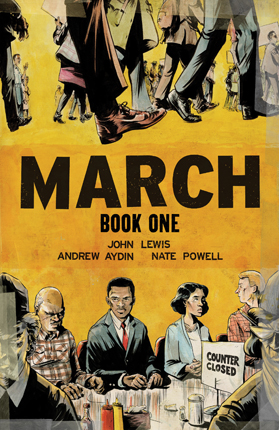| March : book one Author: Lewis, John | ||
| Price: $20.96 | ||
Summary:
A vivid first-hand account of John Lewis' lifelong struggle for civil and human rights, meditating in the modern age on the distance traveled since the days of Jim Crow and segregation. Rooted in Lewis' personal story, it also reflects on the highs and lows of the broader civil rights movement. In graphic novel format.
| Added Entry - Personal Name: | Aydin, Andrew |
| Illustrator: | Powell, Nate |
| Accelerated Reader Information: Interest Level: MG Reading Level: 4.60 Points: 1.0 Quiz: 165513 | Reading Counts Information: Interest Level: 6-8 Reading Level: 5.60 Points: 5.0 Quiz: 63306 | |
Awards:
Coretta Scott King Author Honor, 2014
Common Core Standards
Grade 5 → Reading → RI Informational Text → 5.RI Key Ideas & Details
Grade 5 → Reading → RI Informational Text → 5.RI Craft & Structure
Grade 5 → Reading → RI Informational Text → Texts Illustrating the Complexity, Quality, & Rang
Grade 5 → Reading → RI Informational Text → 5.RI Range of Reading & Level of Text Complexity
Grade 5 → Reading → CCR College & Career Readiness Anchor Standards fo
Reviews:
Kirkus Reviews (+) (07/15/13)
School Library Journal (+) (00/09/13)
Booklist (+) (06/01/13)
The Hornbook (+) (00/01/14)
Full Text Reviews:
Booklist - 06/01/2013 *Starred Review* Congressman Lewis, with Michael D’Orso’s assistance, told his story most impressively in Walking with the Wind (1998). Fortunately, it’s such a good story—a sharecropper’s son rises to eminence by prosecuting the cause of his people—that it bears retelling, especially in this graphic novel by Lewis, his aide Aydin, and Powell, one of the finest American comics artists going. After a kicker set on the Edmund Pettus Bridge in Selma, Alabama, on March 7, 1965 (the civil rights movement’s Bloody Sunday), the story makes January 20, 2009 (President Obama’s inauguration) a base of operations as it samples Lewis’ past via his reminiscences for two schoolboys and their mother, who’ve shown up early at his office on that milestone day for African Americans. This first of three volumes of Lewis’ story brings him from boyhood on the farm, where he doted over the chickens and dreamed of being a preacher, through high school to college, when he met nonviolent activists who showed him a means of undermining segregation—to begin with, at the department-store lunch counters of Nashville. Powell is at his dazzling best throughout, changing angle-of-regard from panel to panel while lighting each with appropriate drama. The kineticism of his art rivals that of the most exuberant DC and Marvel adventure comics—and in black-and-white only, yet! Books Two and Three may not surpass Book One, but what a grand work they’ll complete. - Copyright 2013 Booklist.
School Library Journal - 09/01/2013 Gr 8 Up—Beginning with a dream sequence that depicts the police crackdown on the 1965 Selma-Montgomery March, this memoir then cuts to Congressman John Lewis's preparations on the day of President Obama's inauguration. Lewis provides perspective on the occasion, explaining and describing his own religious and desegregationalist origins in Alabama, his early meeting with Dr. King, and his training as a nonviolent protester. The bulk of the narrative centers around the lunch counter sit-ins in 1959 and 1960 and ends on the hopeful note of a public statement by Nashville Mayor West. The narration feels very much like a fascinating firsthand anecdote and, despite a plethora of personal details and unfamiliar names, it never drags. Even with the contemporary perspective, the events never feel like a foregone conclusion, making the stakes significant and the work important. The narration particularly emphasizes the nonviolent aspect of the movement and the labor involved in maintaining that ideal. The artwork is full of lush blacks and liquid brushstrokes and features both small period details and vast, sweeping vistas that evoke both the reality of the setting and the importance of the events. This is superb visual storytelling that establishes a convincing, definitive record of a key eyewitness to significant social change, and that leaves readers demanding the second volume.—Benjamin Russell, Belmont High School, NH - Copyright 2013 Publishers Weekly, Library Journal and/or School Library Journal used with permission.



